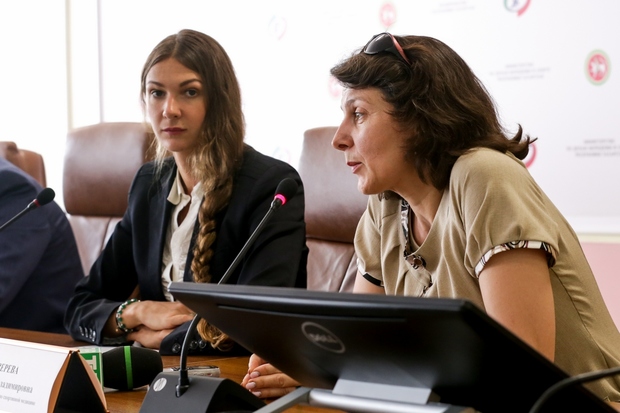‘Doping tsunami’ and ‘cultural revolution’ of Russian sport
During the latest two weeks, two celebrated athletes from Tatarstan at once presented their official statements and summed up their own sad stories of disqualifications for doping. Yulia Zaripova announced she retires from field and track athletics, but Yana Martynova promised to come back to elite sport in three years. In brief, the 'doping tsunami', which battered the Russian sport and is going to exclude the Olympic national team of Russia from Brazilian venues, did not pass by sport Kazan. Details are in the material of Realnoe Vremya.
Will Russia be allowed to Rio?
On 17 June, the International Association of Athletics Federations (IAAF) extended the disqualification of the Russian Athletic Federation, so that the Federation was taken away its chance to participate in the Olympiad in Rio de Janeiro. As it as was known on 19 June, the whole national team of Russia can be disqualified. A scandal of the German documental movie based on the information given by Russian field and track athlete Yulia Stepanova and her husband resulted in the international isolation of the athletes.
The qualification of the Olympic Committee of Russia can follow after the tell-all words of the head of the Moscow Anti-Doping Centre Grigory Rodchenkov. In this case, the honesty of the medals won by Russian athletes in the Winter Olympics in Sochi is questioned. The 'meldonium' scandal, additional expertise of the tests done by Russian athletes in 2008 in Beijing added fuel to the fire. Russian was also reminded the story of the disqualification of famous race walkers and their coach Chagin…

Back to our ladies…
The main heroes of the two press conferences, which took place in the Ministry of Youth Affairs and Sport these days, have not been directly involved in the scandals shocking the Russian sport. In both cases, the athletes decided to break a vow of silence when it was clear they were not going to participate in the 2016 Games in Rio de Janeiro.
Zaripova was not allowed to take part in the Championships of Russia in Sochi according to the decision made by the Presidium of the Russian Athletic Federation in May, who suspended all athletes who had been caught red-handed from the Olympic qualifying. Zaripova's disqualification expired in January, and de-jure she had the right to fight for a ticket to the Olympic Games. But the Federation changed qualifying rules trying to propitiate the administration of IAAF and preserve a chance for 'clean' athletes to participate in the 2016 Olympics.
As a character of Evgeny Yevstigneyev told in a legendary comedy: 'No, I'll do it myself!' It did not help, on 17 June IAAF let the disqualification of the Russian Athletic Federation stand and closed the doors for the Russian field and track athletes to Rio de Janeiro. So, Zaripova was sacrificed in vain in a fight for the allowance to the Olympiad.
Tatarstan athletes blaim WADA and RUSADA
It is interesting that both athletes question the fairness of the decision made by WADA and RUSADA (World Anti-Doping Agency and its Russian department) one way or another. Both of them state the fighters against doping could have taken into account mitigating factors in other circumstances but not today like they became political victims and were included in the list by chance during hot battles of heavy weight lifters. It is what we can often hear from our sports chairs and leading athletes. Retorted reproaches and accusations, doubts about the accuracy and authenticity of detection methods, 'conspiracy theories'… In other words, we are still thinking they are finding our faults, having another attitude to us…
Meanwhile, sports doctor Victoria Zvereva, who was at the press conference with Yana Martynova, commented the unsuccessful attempts of the athlete to prove her innocence and noted the modern 'sports Inquisition' uses the strictest approaches while fighting against doping. While considering cases, an athlete's presumption of innocence is the basic thing. The athlete has extremely few possibilities to prove his or her innocence. It means there is no chance to blame enemies for underhand practices.

A huge job was done, of course, too (the Council of the Russian Athletic Federation changes, a strict law on 'Incitement to Doping'). If IAAF had mercy, Zaripova would not go to the Olympiad as one of these measures. But, the result is a disastrous verdict with a statement that 'the culture of doping in the Russian Athletic Federation has not changed yet'.
About the 'culture of doping'
And all these talks about culture… I remembered a recent talk to one of the sports doctors, who is quite authoritative, who is inclined to transfer the doping problem to the culture. In his opinion, doping is a sign of the loss of psychological stamina. 'A Dane can easily retire from sport at the peak wishing to do something different, change his lifestyle, and he will be sure his lifestyle won't be completely different after he ends his career. People are more self-sufficient there,' he told. In his description, a Russian athlete was a kind of cornered person who understands only as long as possible and successful life in sport is a guarantee of a relatively comfortable life and a decent social status.
It is possible that now when we are on the margins in a race for the 'leadership in medal tally and when previous ambitious goals are unattainable a priori, it's time to set other more meat-and-potatoes goals and deal with this 'culture'.